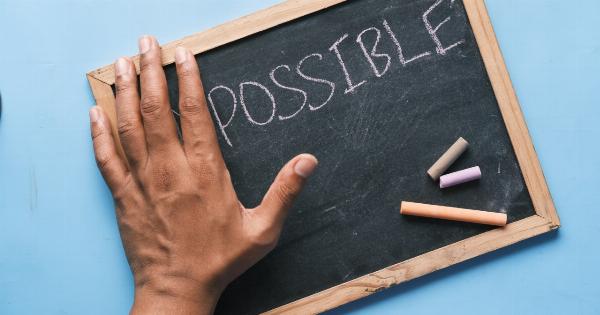In today’s society, discussions and debates surrounding belief systems and practices have become increasingly important.
While beliefs are deeply personal and subjective, it is vital to gain a comprehensive understanding of different perspectives to foster harmony and productive conversation. In this article, we will delve into the male perspective on belief, exploring the factors that shape their perceptions and the impact these perspectives have on society.
The Role of Culture and Society
Culture and society play a significant role in shaping an individual’s beliefs, and this applies to both men and women. Traditionally, men have often been associated with patriarchal societies that emphasize dominance, power, and control.
These societal expectations can influence their beliefs, as they may feel the need to conform to traditional gender roles and adhere to certain religious or moral values dictated by their community.
However, it is essential to note that not all men subscribe to these traditional beliefs. As societies evolve and become more inclusive, many men challenge and question societal norms, seeking to create a more egalitarian and open-minded world.
Consequently, their beliefs may differ significantly from those imposed by their cultural background, as they strive to develop their unique perspectives.
Personal Experiences and Individual Identity
Just like women, men have their unique set of experiences that shape their beliefs. Childhood upbringing, education, personal relationships, and exposure to diverse cultures contribute to the formation of individual identity and belief systems.
For example, a man who grew up in a religious household might base his beliefs on the teachings and values instilled during his childhood.
His personal experiences within that religious community, such as engaging in rituals or participating in religious events, may reinforce and strengthen his faith. On the other hand, a man who had negative experiences or conflicting views within a particular faith might choose to reject or modify those beliefs based on his personal encounters.
Furthermore, education plays a crucial role in shaping beliefs. Academic environments expose individuals to various philosophies, scientific theories, and critical thinking.
These influences can lead men to question their existing beliefs or adopt new ones based on evidence and rationality.
Relationships and Role Models
Men are influenced by the people they associate with and the role models they admire. Friends, family, mentors, and public figures can all have a significant impact on an individual’s beliefs and perspectives.
For instance, a man who looks up to an influential philosopher might adopt their philosophical stance and incorporate it into his own belief system.
Psychologically, humans seek affiliation and validation from their social groups, and this desire is prevalent among men as well. Belonging to a community of like-minded individuals with shared beliefs can provide a sense of security and identity.
Conversely, when confronted with beliefs that contradict their own, men may feel threatened or defensive, reinforcing their existing convictions.
Media and Cultural Influences
In today’s digital age, media plays an instrumental role in shaping beliefs and attitudes. Men are exposed to a wide range of media, including television, movies, news outlets, and social media platforms.
These platforms have the power to spread both positive and negative messages, as well as perpetuate stereotypes and biases.
The media not only influences men’s beliefs but also reflects and reinforces societal ideologies. For example, traditional gender roles and expectations are often portrayed and perpetuated in advertisements, films, and television shows.
This exposure can have a deep impact on men’s perceptions of themselves, their roles in society, and their belief systems.
The Intersection of Belief and Masculinity
Men’s beliefs are often intertwined with their sense of masculinity. Societal expectations of what it means to be a man can influence the way men express their beliefs or the types of beliefs they feel drawn to.
For instance, men may be more inclined to adopt beliefs that align with notions of strength, independence, and success.
The intersection of belief and masculinity is complex and multi-faceted, influenced by centuries of cultural and societal conditioning. However, it is crucial to recognize that masculinity is not monolithic, and beliefs can vary greatly among men.
Some men may prioritize nurturing and empathy, embracing beliefs that emphasize compassion and inclusivity.
The Positive Impact of Diverse Beliefs
Although beliefs can sometimes be a point of contention, understanding and embracing diverse perspectives can lead to positive societal change.
When men engage in open-minded dialogue and challenge their own beliefs, they contribute to social progress and create a more inclusive environment for all.
By actively seeking out and listening to different perspectives, men can learn from one another, broaden their understanding of the world, and establish stronger connections within communities.
Uniting individuals with varied beliefs and backgrounds ultimately fosters a sense of empathy, compassion, and mutual respect.
The Importance of Emotional Intelligence
Beliefs are an expression of an individual’s values and principles, which are closely tied to emotions. Emotional intelligence plays a critical role in understanding and navigating diverse beliefs.
Men who cultivate emotional intelligence skills can communicate their beliefs effectively, with empathy and respect for others.
Emotional intelligence allows men to recognize and regulate their own emotions, which can help prevent heated debates and conflicts when discussing controversial topics.
This skill also enables men to actively listen to opposing viewpoints, empathize with others’ experiences, and engage in productive conversations that foster understanding and growth.
Conclusion
The male perspective on belief is multifaceted, shaped by a myriad of factors such as culture, personal experiences, education, relationships, and media influences.
Recognizing and understanding these factors is crucial in promoting dialogue, empathy, and acceptance.
By valuing diverse beliefs and engaging in respectful conversations, men can contribute to a more inclusive society.
Embracing emotional intelligence and critical thinking allows for the exploration of different perspectives, leading to personal growth and social progress.































